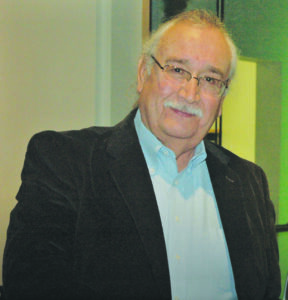Black Hills Film Festival goes virtual with Native headliners
HILL CITY – The Black Hills Film Festival opens its curtains on a 12th annual season Feb. 18-25 with a tribute to Cheyenne River Sioux tribal member, performer, and festival mainstay Barry LeBeau, as well as a non-fiction production about a Standing Rock Sioux teen tribal member.
The local non-profit festival, providing films from the world over and specializing in titles of particular interest to the Black Hills viewing public, will be more accessible than ever this year with its first ever all-virtual format.
Among dozens of movies destined to attract attention this season is “My Name Is Future,” which fuses the vision of Lakota youth pipeline fighter and climate justice advocate Tokata Iron Eyes with the art of Andrea Bowers, a Los Angeles-based activist who was moved by their visit at the Oceti Sakowin camps, which provided grassroots backing for tribal lawsuits against the Dakota Access Pipeline in 2016-2017.
Iron Eyes, a 16-year-old from Standing Rock, hosted Swedish youth climate action leader Greta Thunberg when she visited Lakota Territory on her 2019 tour of Turtle Island. The young Native woman has been involved with the movement to stop the Dakota Access Pipeline since its inception.
Bowers is a multimedia creator whose work is on exhibit in the collections at MoMA NY, The Whitney Museum, The Hirshhorn, MoCA LA, and German galleries.
She learned that Tokata means future in Lakota and that youth from Lakota communities were at the forefront of the movement to stop DAPL. “During my stay at the Standing Rock camps, I was moved by the activism of these young water protectors. One of them was Tokata Iron Eyes,” Bowers recalls.
She said she asked Iron Eyes “to show us some of her most sacred places in South Dakota. With a small group of friends – all artists and activists, we traveled together recording video interviews and landscape drone shots” while discussing their histories, as well as the personal and political issues that arose from being in these sacred sites,” she relates in festival program notes.
Bowers applied her media skills to direct the 51-minute show because “I believed along with thousands of other opponents of DAPL that the pipeline threatens sacred native lands and could contaminate the Missouri River—the longest river in North America,” she explains.
“I want to thank Tokata Iron Eyes for graciously sharing some of her most sacred sites in South Dakota and for lending her voice, intelligence and joy to this film,” Bowers says. “I can’t wait to see the gifts she gives this world in the future.”
Tickets are available online at $9.99 for this or any other single release on the festival program. Gift certificates, day passes, and full festival passes also are available through the internet. Films will display on your TV, computer, or mobile phone.
Up until this year, the festival’s tribute recipient Barry LeBeau was a master of ceremonies for the screenings, which were held at theaters in communities throughout the Black Hills.
With the novel coronavirus pandemic encouraging moviegoers to stay home and make their own popcorn while watching shows, a business called Film Festival Flix is stepping up to provide a digital platform introducing the offerings for the Black Hills Film Festival.
LeBeau passed away unexpectedly at age 69 while at his Pierre residence in late March of 2020. He was an actor, voice talent, narrator and announcer for the South Dakota Symphony’s Lakota Music Project, a tribal relations consultant, as well as an Indian affairs and arts lobbyist.
LeBeau played the Trickster in the 1999 creative release “Yes I am Not Iktomi”, in which he wears a coyote mask in the role of protagonist for a half-hour blend of legend and satire filmed in the Black Hills, which includes a deconstruction of Mt. Rushmore through filmic special effects.
He was the first member of the Black Hills Film Festival board of directors after the festival’s creation by its three founders in 2009. He served several terms as president and secretary, as well as 11 years in the capacity of master of ceremonies.
“Barry, we will miss your dedication, sense of humor, big voice and hearty laugh,” his colleagues say in a message shared with festival fans.
The song “Between Earth and Sky” accompanies his homage, thanks to Ojibwe-Tohono O’odham musician Darren Thompson, who recorded the original composition and played it on an 800-year-old Pueblo flute made of western cedar.
During the festival, a 48-minute presentation of “7th Generation” will examine how Oglala Lakota tribal member, advocate and educator, Jim Warne helps tribal nations find a way to succeed in a contemporary American system and still remain Indian at heart.
Filmed in South Dakota, this award-winning feature documentary covers generations of history. It addresses past and current perspectives gleaned from elders and community members, focusing on a positive future for youth – the seventh generation.
A Native American Short Program, underwritten by The Puffin Foundation Ltd. will provide more than an hour of viewing that covers “She Carries On – directed by Isaac Fowler, Tim Morris and produced by Natalie Welch, Nick Geidner; “Little Wolf: The Night Trail” – written an animated by Jesse Cowan; “Whiteface” – written by Todd Houseman, Lady Vanessa Cardona, Everett Sokol, Sam Burns and directed by Everett Sokol; “The Lakota Daughters” – written and directed by Victoria Kupchinetsky; and “HOP ALONG HANG ON” – written and directed by Cobra Collins, produced by Xstine Cook.
The festival is presented thanks to support from South Dakota Community Foundation, South Dakota Arts Council, Hill City Chamber of Commerce. Supporting sponsors are the HomeSlice Group, KEVN and KOTA. Hill City Arts Council and Stu Fromm provide additional backing.
Tickets can be reserved at filmfestivalflix.com/black-hills/purchase-tickets/#festival-passes
(Contact Talli Nauman at talli.nauman@gmail.net)
The post Black Hills Film Festival goes virtual with Native headliners first appeared on Native Sun News Today.

